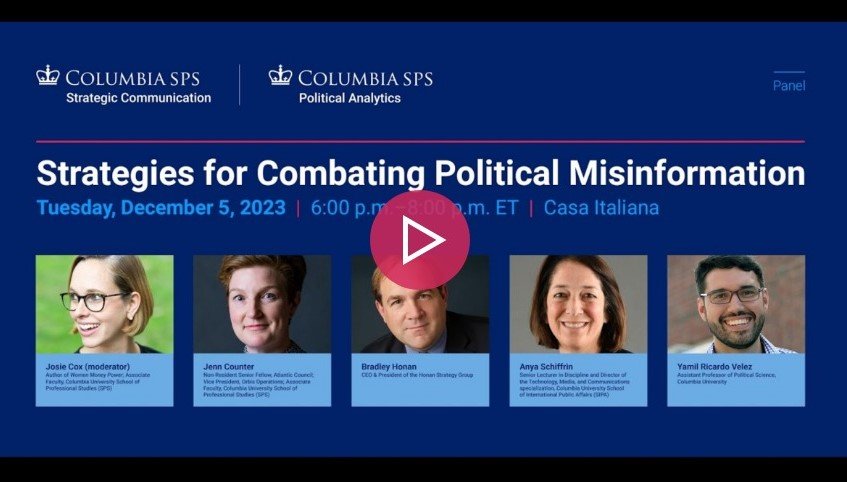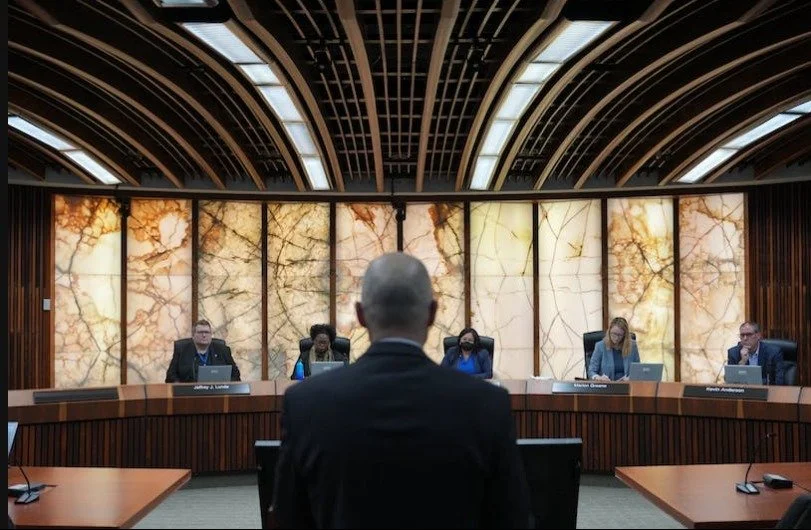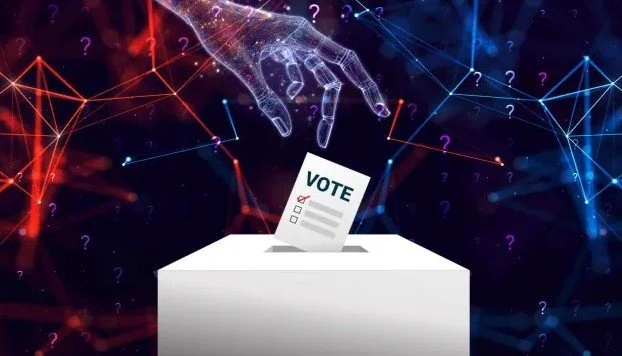In a world increasingly fraught with risks, leading near-term concerns are shifting to the dangers of technology and related problems like the spread of disinformation, and away from economic worries, according to an annual survey of policymakers, industry leaders and experts on risk conducted by the World Economic Forum.
Wall Street Journal
With the 2024 elections less than a year away, a recent survey found 53% of Americans say they see false or misleading information online every day. Lisa Fazio, associate professor of psychology at Vanderbilt University, joins CBS News to unpack why people fall for misinformation -- and what it's doing to our brains.
CBS News
The M.S. in Strategic Communication and M.S. in Political Analytics programs sponsored a panel discussion on strategies for combating political misinformation.
Columbia University
Residents who want to address elected leaders in a public forum may not have much of an audience, if they have the opportunity at all, as some local governments scale back opportunities for public comment in meetings.
Minneapolis Star-Tribune
Unfounded claims about offshore wind threatening whales have surfaced as a flashpoint in the fight over the future of renewable energy.
Associated Press
There is a huge amount of misinformation about food and nutrition on the Internet and many people are often fooled into following this 'advice', even if it doesn't come from a qualified source.
Omaha World-Herald
The global anti-vaccine movement and vaccine hesitancy that accelerated during the COVID-19 pandemic show no signs of abating. According to a survey of U.S. adults, Americans in October 2023 were less likely to view approved vaccines as safe than they were in April 2021.
The Conversation
Misinformation refers to news or information that is verifiably false, inaccurate, or misleading. Misinformation can quickly spread across the Internet, when it is shared by readers and amplified through social media algorithms. The spreading of false or misleading information has the potential to negatively impact Canadians' wellbeing and confidence in public institutions.
Statistics Canada
A Republican-led campaign against researchers who study disinformation online has zeroed in on the most prominent American government agency dedicated to countering propaganda and other information operations from terrorists and hostile nations.
New York Times
The European Union on Monday made Elon Musk’s online platform X the first tech company to face an investigation under Europe’s tough new regulations designed to clean up social media and protect people from toxic online content.
PBS
Texas is one of only four states in the U.S. that mandate a media literacy curriculum in all public schools beginning in kindergarten. Fourteen other states offer some form of media literacy education or online resources to public school students.
CBS News
Over the summer, a political action committee (PAC) supporting Florida governor and presidential hopeful Ron DeSantis uploaded a video of former president Donald Trump on YouTube in which he appeared to attack Iowa governor Kim Reynolds. It wasn’t exactly real—though the text was taken from one of Trump’s tweets, the voice used in the ad was AI-generated.
Wired
California next year will become one of the few US states to teach students media literacy, a move experts say is imperative at a time when distrust in the media is at an all-time high and new technologies pose unprecedented challenges to identifying false information.
The Guardian
In this episode of "The Middle with Jeremy Hobson," we're asking whether or not you think democracy itself is at stake in the 2024 election - or if those fears are overblown. Jeremy is joined by Maricopa County, Arizona Supervisor Bill Gates and Vernon Burton, a voting rights expert and professor of history at Clemson University.
The Middle
Misinformation is debated everywhere and has justifiably sparked concerns. It can polarise the public, reduce health-protective behaviors such as mask-wearing and vaccination, and erode trust in science. Much misinformation is spread not by accident but as part of organized political campaigns, in which case we refer to it as disinformation.
Alliance For Science
Until recently, media literacy has not been a priority for the majority of the country. Only 18 states have some legislative solutions in place for addressing media literacy education. But with generative AI on the rise and increasingly used in everyday digital media states are coming to grips with providing the most vulnerable populations with the tools to help them avoid being misinformed.
Governing
In a small meeting room on the University of Washington campus, researcher Kate Starbird stood at a glass whiteboard as she brainstormed with two doctoral students how to dissect information posted to the politicized, hyperbolic and often wildly speculative free-for-all that is social media.
The Seattle Times
The authors reviewed 555 papers published from 2016–2022 that presented misinformation to participants, and identified several trends in the literature—increasing frequency of misinformation studies over time, a wide variety of topics covered, and a significant focus on COVID-19 misinformation since 2020.
Harvard Misinformation Review
In the battleground state of Arizona, an unlikely media player is positioning itself as a major purveyor of truth amid a landscape filled with misinformation and disinformation — most notably some Republicans' false claims of election fraud in the state during the 2020 elections.
NBC News
Electoral disinformation has emerged as a significant threat to democratic processes in countries around the world. According to a recent global study by UNESCO, 85% of people worry about online disinformation, especially its impact on elections.
International Journalists’ Network




















